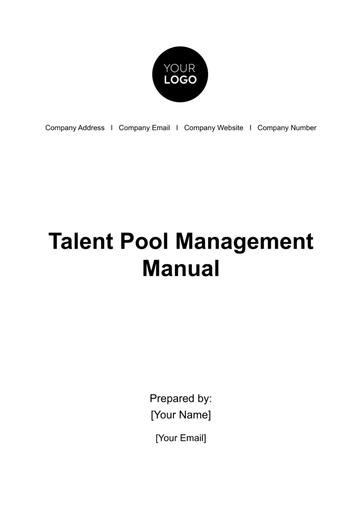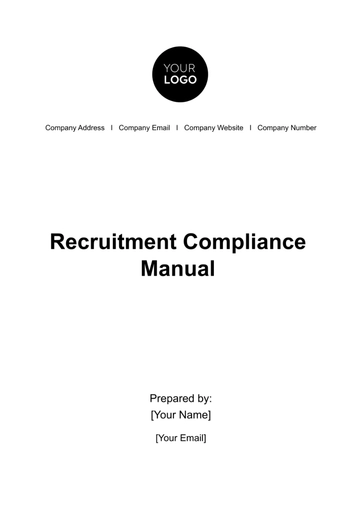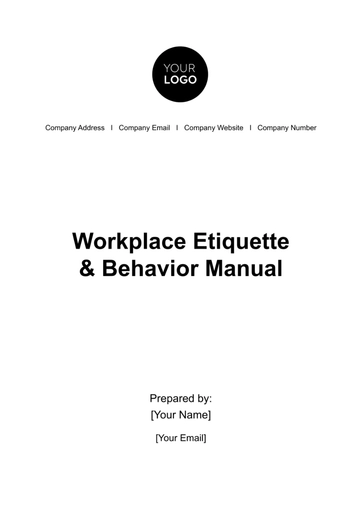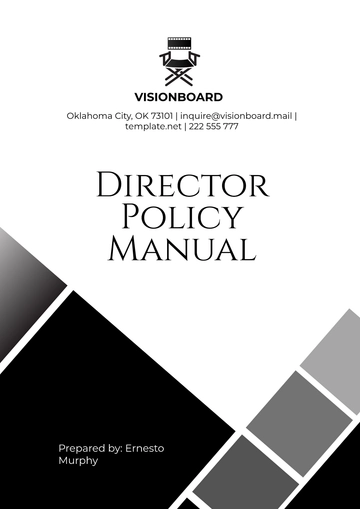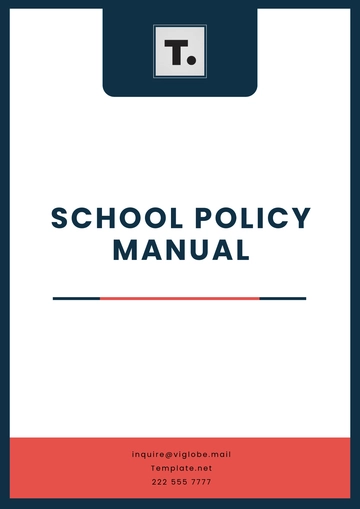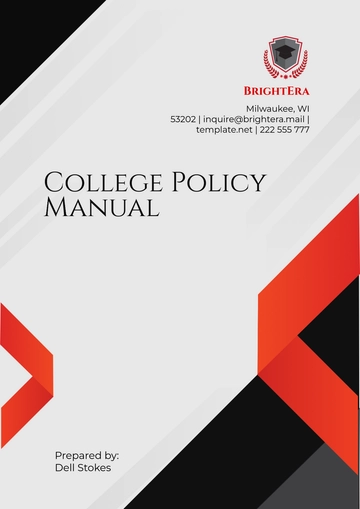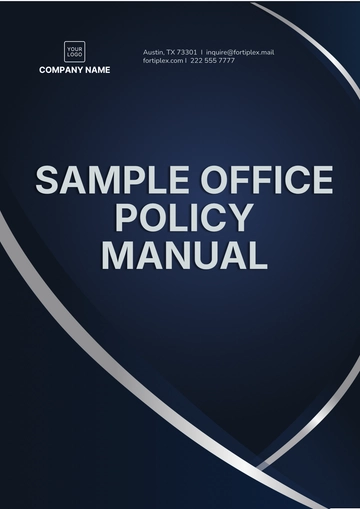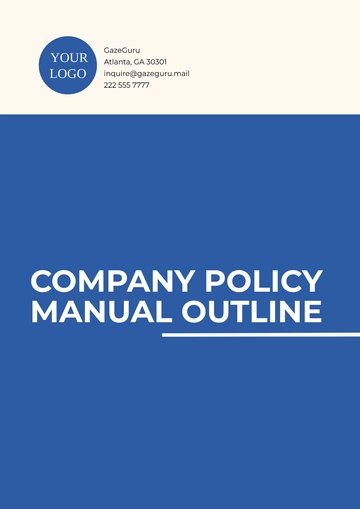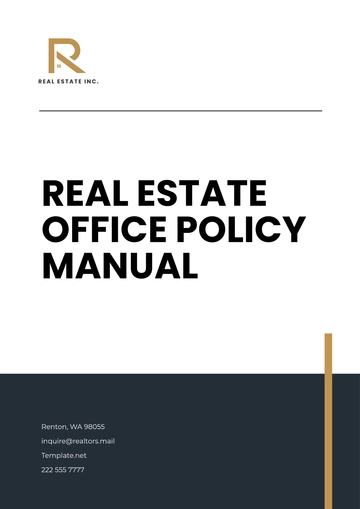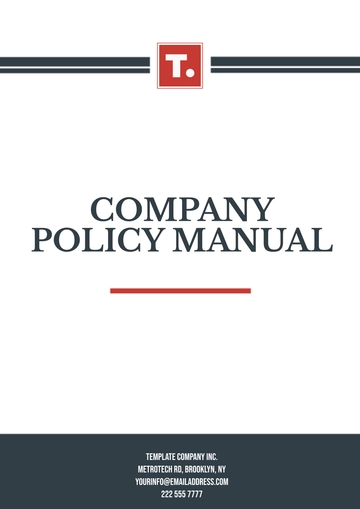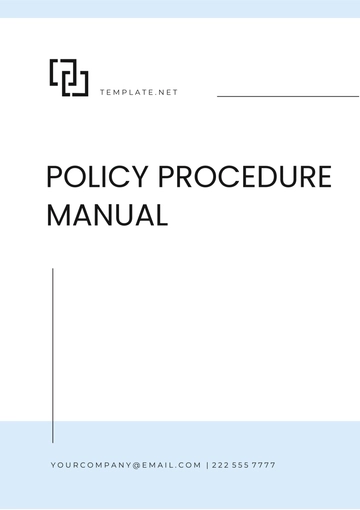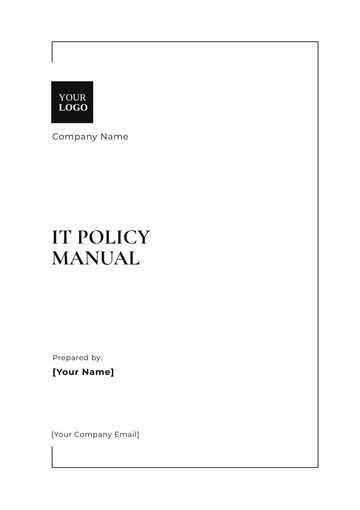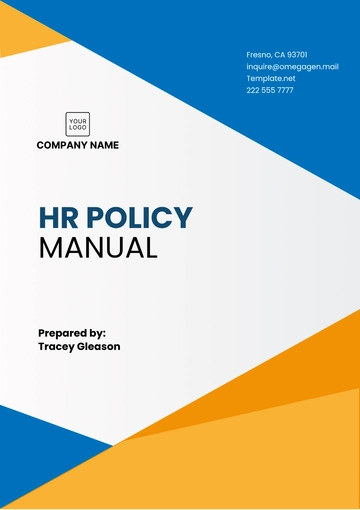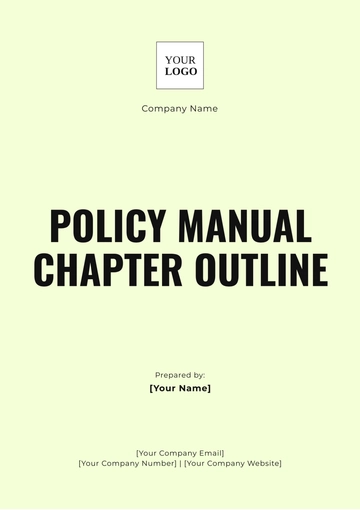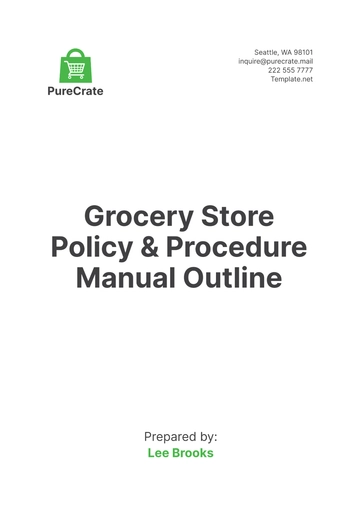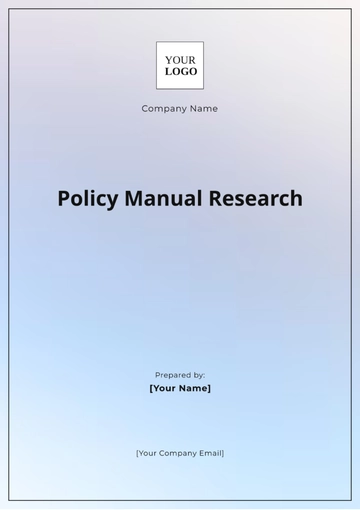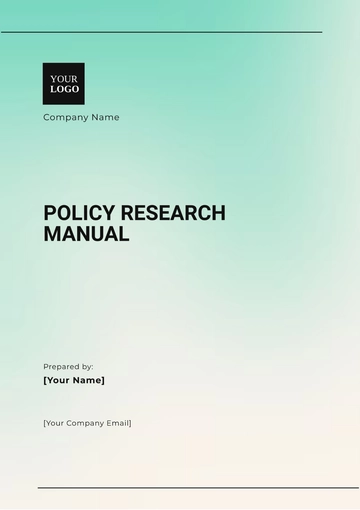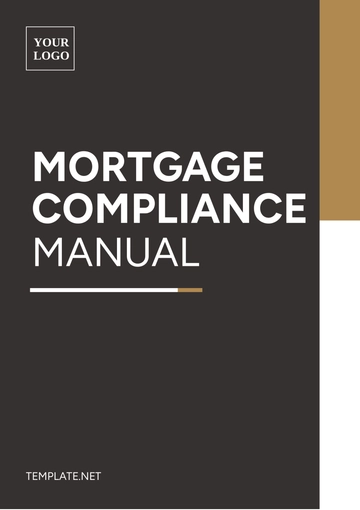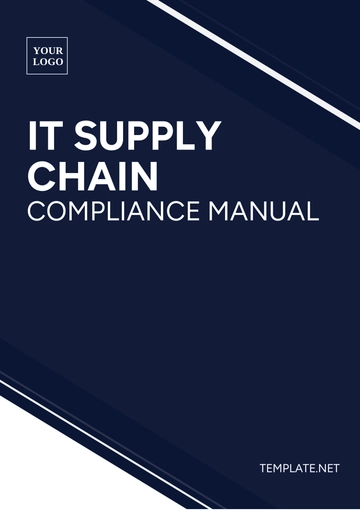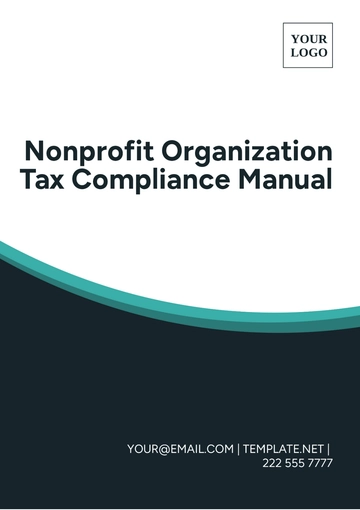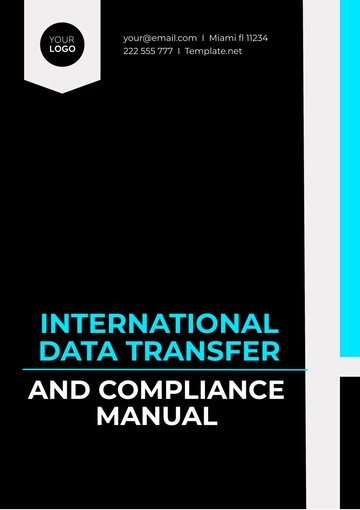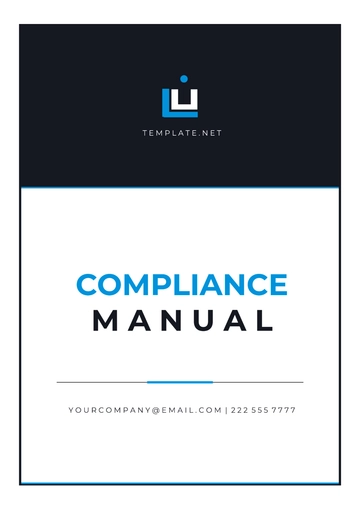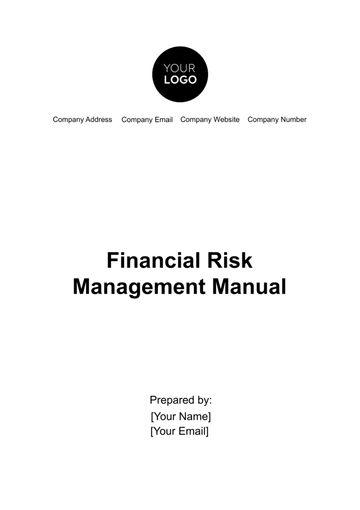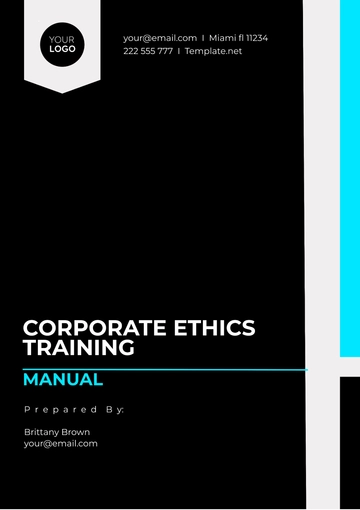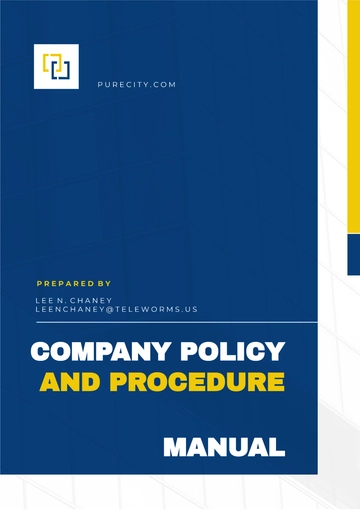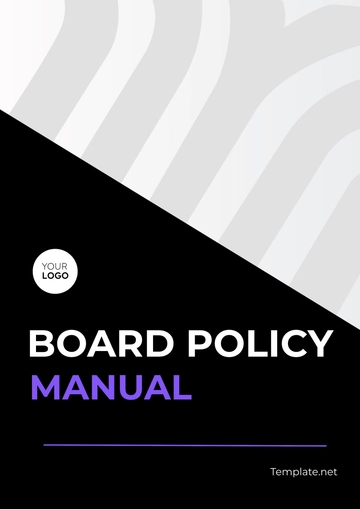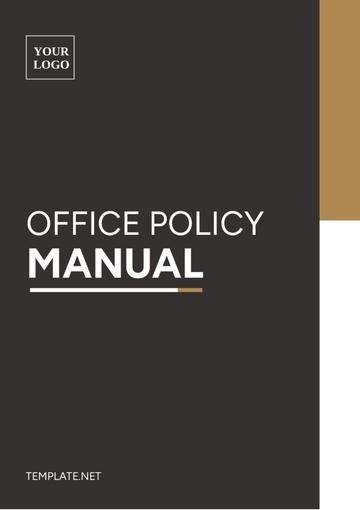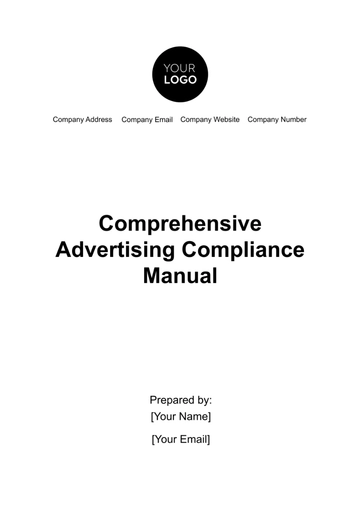Free Employee Travel and Expense Policy Manual HR
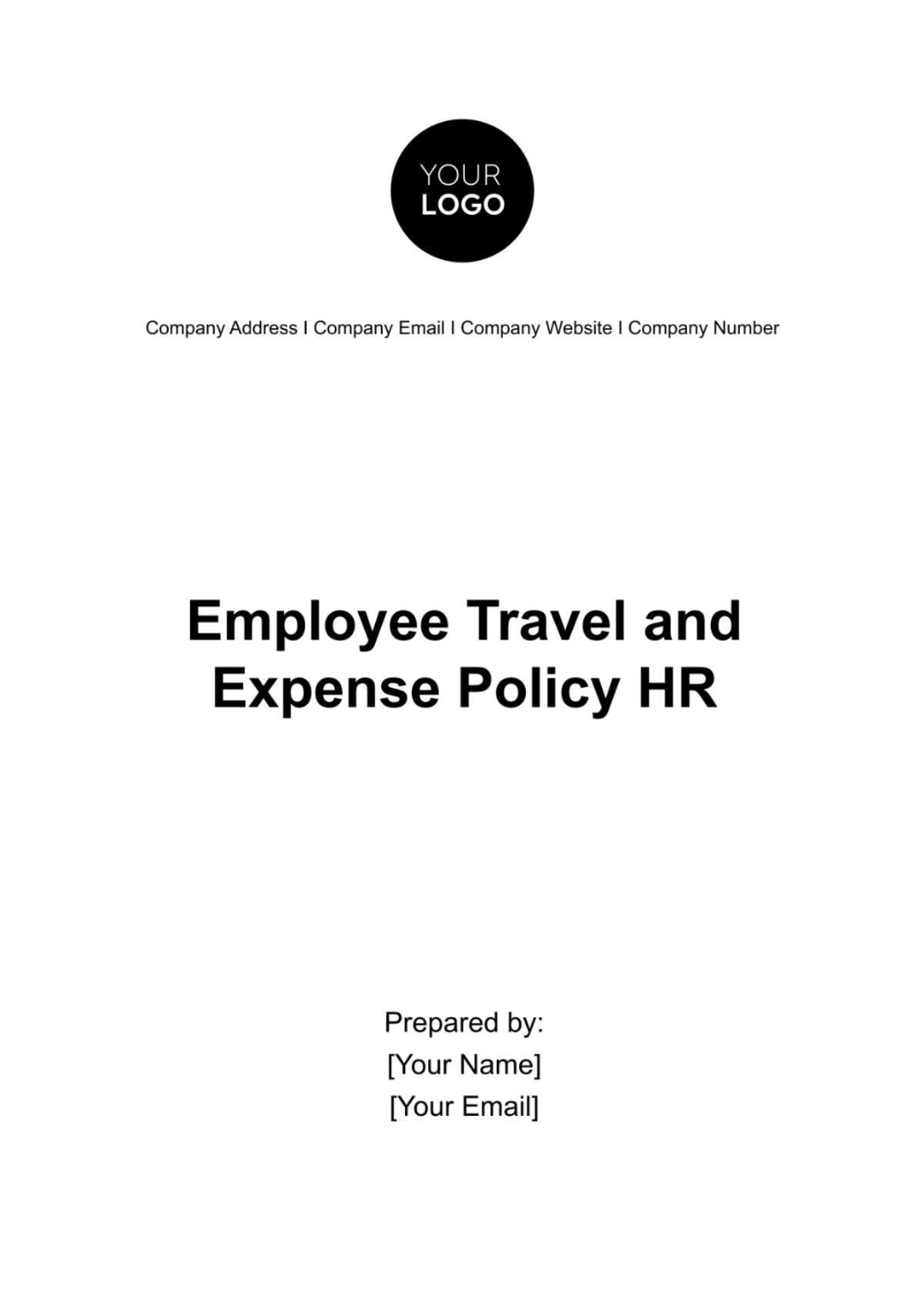
Welcome to [Company Name]'s Employee Travel and Expense Policy Manual. This comprehensive document serves as a guiding framework for all employees and contractors who undertake business-related travel on behalf of our IT company. We understand that travel is an integral part of our business operations, and this policy is designed to ensure that such travel is conducted efficiently, responsibly, and in accordance with our company's values and financial goals.
Business travel, whether domestic or international, plays a crucial role in fostering client relationships, exploring new opportunities, and expanding our footprint in the ever-evolving IT industry. We value the dedication and commitment of our employees in representing our organization during these journeys. However, with the privilege of traveling on behalf of [Company Name] comes the responsibility to manage expenses judiciously, safeguard company resources, and adhere to established guidelines.
The primary purpose of this Employee Travel and Expense Policy Manual is to provide a clear and comprehensive set of guidelines and procedures for our employees when it comes to incurring and reporting travel-related expenses. We recognize that the careful management of expenses is not only essential for our financial health but also a reflection of our commitment to ethical and responsible business practices.
Purpose of the Policy
The Employee Travel and Expense Policy Manual of [Company Name] serves as a foundational document designed to fulfill several critical purposes:
Financial Responsibility
This policy is crafted to ensure that employees and contractors exercise financial prudence when conducting business travel on behalf of [Company Name]. It sets clear guidelines and expectations for managing expenses, which are essential for the prudent allocation of company resources.
Accountability and Transparency
The policy establishes a structured framework for the authorization, reporting, and reimbursement of travel-related expenses. By adhering to this policy, employees contribute to a culture of accountability and transparency within the organization, assuring stakeholders that company funds are used responsibly.
Consistency
Business travel involves a wide range of expenses, from airfare and accommodations to meals and entertainment. This policy ensures that all employees follow consistent practices when incurring and reporting these expenses. Consistency fosters fairness and reduces the risk of discrepancies or misunderstandings among employees.
Compliance with Legal and Regulatory Requirements:
Business travel often involves navigating a complex landscape of tax regulations and compliance standards, especially when traveling internationally. This policy provides clear instructions and safeguards to ensure that employees remain in compliance with relevant legal and regulatory requirements.
Efficient Expense Management:
Efficiently managing travel expenses is vital to maintaining our company's financial health. This policy equips employees with the knowledge and procedures necessary to minimize costs while optimizing value for the company, ensuring that every expense contributes to our overall success.
Scope of the Policy
The scope of [Company Name]'s Employee Travel and Expense Policy Manual is comprehensive and applies to all individuals, including employees and contractors, who are authorized to travel on behalf of the company for business-related purposes. This policy encompasses a wide range of activities related to business travel and expense management, ensuring that employees understand their responsibilities and obligations when traveling on behalf of the organization.
Employees
This policy is applicable to all employees of [Company Name], regardless of their position, department, or location. Whether it's a senior executive attending a high-profile conference or a junior developer visiting a client's site, all employees are expected to adhere to this policy when incurring and reporting travel-related expenses.
Contractors
Contractors engaged by [Company Name] to perform services or projects may also be subject to this policy if their contract stipulates travel and expense management obligations. Contractors must comply with the relevant sections of this policy to ensure consistency and transparency in financial matters.
Business Travel
The policy covers all forms of business-related travel, whether domestic or international. This includes travel for client meetings, conferences, training sessions, sales visits, project deployments, and any other activities approved and authorized by [Company Name].
Policy Guidelines
The policy guidelines within [Company Name]'s Employee Travel and Expense Policy Manual are designed to provide clear and comprehensive instructions to employees and contractors on various aspects of business travel and expense management. These guidelines are intended to promote responsible and cost-effective travel practices while ensuring compliance with company policies and applicable regulations. It is imperative that all employees and contractors understand and adhere to these guidelines when undertaking business-related travel on behalf of the company.
Travel Authorization
Authorization Requirement: All business travel must be pre-authorized by the employee's immediate supervisor or manager. The Travel Authorization Request Form must be completed and approved before any travel-related arrangements are made.
Business Justification: The Travel Authorization Request Form should include a clear and concise business justification, explaining the purpose, objectives, and expected outcomes of the trip. This ensures that travel aligns with company goals and is financially justifiable.
Booking and Planning Travel
Preferred Booking Method: Business travel arrangements, including flights, accommodations, and ground transportation, should be made through [Company Name]'s designated travel agency or an approved online booking platform. This helps the company access negotiated rates and ensures consistency in travel management.
Cost Consideration: Employees are encouraged to select the most cost-effective travel options that meet the requirements of the trip. Cost-conscious decisions should be made without compromising safety, comfort, or productivity.
Travel Itinerary Review: Before confirming bookings, employees must share their travel itineraries with their managers for review and approval. Managers may suggest adjustments to ensure the trip aligns with business objectives and budget constraints.
Air Travel
Economy Class: For domestic travel, employees are expected to book economy-class flights whenever possible, unless business-critical reasons justify an upgrade.
Business/First-Class Travel: Business-class or first-class travel may be approved for long-haul international flights, typically exceeding 6 hours, or under exceptional circumstances with prior approval from the Finance Department and senior management.
Accommodation
Cost-Efficient Choices: Employees should choose accommodations that are reasonably priced and align with the nature of the trip. Staying within [Company Name]'s preferred hotel network is encouraged, although employees may select alternatives if they offer better value.
Duration of Stay: Accommodation bookings should only cover the necessary duration of the trip. Extended stays for personal reasons will not be reimbursed.
Ground Transportation
Cost-Effective Options: Employees are expected to use cost-effective modes of ground transportation, such as public transit or company-provided vehicles when available. Rental cars should only be reserved when necessary and with justification.
Fuel and Mileage: When using personal vehicles for business travel, employees may be eligible for mileage reimbursement as per [Company Name]'s mileage reimbursement policy. Fuel expenses are generally not reimbursed.
Expense Reporting and Documentation
The following section outlines the detailed procedures and requirements for reporting and documenting expenses related to business travel within [Company Name]. Adhering to these guidelines ensures accurate, transparent, and compliant reporting of expenses, facilitating efficient reimbursement processes and maintaining the financial integrity of the organization.
Receipts and Documentation
Receipts Requirement: For all expenses incurred during business travel, original, itemized receipts are mandatory. These receipts must include the following information:
Date of the transaction
Vendor or service provider's name
Description of items or services purchased
Quantity and unit prices (if applicable)
Total amount paid, including taxes and tips
Electronic Receipts: Electronic receipts are acceptable, provided they meet the same criteria as paper receipts. Screenshots or scanned copies of receipts are permissible as long as they are clear, legible, and contain all required information.
Expense Report Program
Timely Submission: Employees and contractors must submit their expense reports in a timely manner. Expense reports should be submitted within 7 days of completing the trip but no later than 10 days from the end of the month in which the expenses were incurred. Delays in submission may result in delays in reimbursement.
Expense Report Format: Expense reports should be completed using the company's designated expense report template or software. The template will include fields for categorizing expenses, attaching receipts, and providing explanations where necessary.
Approval Reimbursement
The following section outlines the detailed procedures for the approval and reimbursement of expenses incurred during business travel within [Company Name]. These procedures are designed to ensure that expenses are reviewed, approved, and reimbursed efficiently, maintaining transparency, accuracy, and compliance with company policies.
Approval Process
Manager Approval: Upon the completion and submission of the expense report by the employee or contractor, the first step in the approval process is obtaining approval from the employee's immediate supervisor or manager. The manager is responsible for reviewing the report for accuracy, compliance with company policies, and alignment with the trip's business justification.
Manager's Role: The manager's role is to assess the necessity and reasonableness of expenses, verify that proper documentation and receipts are attached, and ensure that expenses are consistent with the purpose of the trip.
Approval or Feedback: The manager may choose to approve the expense report, request clarifications or additional information, or reject the report if it does not comply with company policies or lacks proper documentation.
Timely Submission
Secondary Review: After the manager's approval, the expense report undergoes a secondary review by the Finance Department or designated personnel. This review focuses on compliance with company policies, tax regulations, and any specific contractual obligations.
Reconciliation: The Finance Department reconciles the expenses against available budgets and allocated funds for the relevant projects or activities.
Timely Reimbursement: Once the expense report has received both manager and Finance Department approval, it enters the reimbursement phase. Reimbursements should be processed promptly, ideally within 5 days of the final approval.
Reimbursement Process
Clear Reimbursement Schedule: [Company Name] maintains a clear reimbursement schedule, which outlines the standard processing times for reimbursements. Employees and contractors should be aware of these timelines and anticipate when to expect their reimbursement.
Reimbursement Currency: Reimbursements are generally provided in the company's currency, regardless of the currency in which expenses were incurred. The exchange rate used for conversion is typically the one in effect on the date of reimbursement.
Reimbursement Taxes: Reimbursements are typically not subject to additional taxes. However, employees should be aware of any tax implications specific to their location or circumstances and consult with the Finance Department or tax experts if needed.
Company Credit Cards
The use of company-issued credit cards for business travel and related expenses is a convenient and efficient way to manage expenses while ensuring compliance with [Company Name]'s policies and financial controls. This section outlines the detailed guidelines and procedures for the issuance and responsible use of company credit cards.
Eligibility: Eligibility for a company-issued credit card is determined by the employee's role, travel frequency, and specific business needs. Approval for a company credit card is typically granted by the Finance Department in consultation with department heads.
Application Process: To obtain a company credit card, employees must submit a formal request to the Finance Department. The request should include a business justification outlining the need for the card and the expected frequency of use.
Credit Card Responsibility: Employees issued company credit cards are responsible for their safekeeping and compliance with this policy. Credit cardholders are accountable for all expenses charged to the card, including proper documentation and adherence to company guidelines.
Cardholder Agreement: Prior to receiving a company credit card, employees must sign a cardholder agreement acknowledging their responsibility for the card and their commitment to comply with company policies and reporting requirements.
Violations and Consequences
The following section outlines the violations and consequences associated with non-compliance with [Company Name]'s Employee Travel and Expense Policy Manual. These measures are in place to ensure accountability, protect the company's financial integrity, and encourage adherence to the policy's guidelines.
Violations of Policy
Policy Violations: Violations of this policy include but are not limited to the following:
Submitting inaccurate or incomplete expense reports.
Failing to obtain proper authorization for business travel.
Using company funds for personal expenses.
Misusing company credit cards for unauthorized or personal purchases.
Consequences of Violations
Warning: In cases of minor or unintentional violations, employees may receive a written warning or counseling from their supervisor or the Finance Department. Warnings are intended to educate and remind employees of the policy's importance and the need for compliance.
Suspension of Privileges: Repeated or more severe violations may result in the suspension of certain privileges, such as the use of a company credit card or the ability to obtain travel advances. Suspension is implemented to protect the company's financial interests.
Reimbursement Requirement: Employees found to have used company funds for personal expenses, including company credit card misuse, may be required to reimburse the company for the unauthorized charges. Reimbursement will be arranged by the Finance Department.
Dispute Resolution
Dispute Resolution Process: In cases where employees believe they have been unjustly accused of policy violations, or if there is a dispute related to expenses or consequences, employees have the right to engage in a dispute resolution process. This process involves a thorough review of the matter by the Finance Department, HR, and relevant management, with the goal of resolving disputes in a fair and transparent manner.
Confidentiality: All dispute resolution processes will be conducted confidentially and in accordance with company policies and legal requirements.
[Company Name] recognizes that policy violations can occur unintentionally or as a result of misunderstandings. While the consequences outlined above are intended to uphold the integrity of the policy, we also value open communication and fairness. Employees are encouraged to seek clarification and resolution through proper channels in cases of disputes or concerns related to policy violations.
Policy Compliance
Ensuring policy compliance is essential to maintaining financial transparency, accountability, and the effective management of expenses within [Company Name]. All employees and contractors authorized to travel on behalf of the organization are expected to adhere to the guidelines outlined in this Employee Travel and Expense Policy Manual. Compliance with this policy is not only a requirement but also a reflection of our collective dedication to the success and sustainability of our organization.
Compliance Acknowledgment
Acknowledgment of Policy: Upon joining [Company Name], all employees and contractors will be required to read, understand, and acknowledge their compliance with this policy. Acknowledgment can be in the form of a signed agreement or electronic acknowledgment.
Annual Compliance Review: Employees and contractors will be encouraged to review the policy annually to stay informed of any updates or changes. It is the responsibility of individuals to remain current with policy revisions.
Responsibility of Employees and Contractors
Adherence to Policy: All individuals traveling on behalf of [Company Name] are expected to adhere to the policy guidelines regarding travel authorization, expense management, documentation, and reporting.
Manager's Role: Managers and supervisors play a critical role in ensuring compliance within their respective teams. They are responsible for authorizing travel, approving expense reports, and providing guidance to employees under their supervision.
Reporting Non-Compliance
Whistleblower Policy: [Company Name] has a whistleblower policy in place that allows employees and contractors to report any suspected violations of this policy or unethical behavior related to travel and expenses. Reports can be made anonymously and will be treated with confidentiality and sensitivity.
Responsibility to Report: All employees and contractors have a responsibility to report policy violations or concerns. Reporting non-compliance is an act of integrity and contributes to the ethical culture of the organization.
Periodic Audits and Reviews
Internal Audits: [Company Name] may conduct periodic internal audits or reviews to assess compliance with this policy. Audits are carried out by the Finance Department or designated personnel.
External Audits: In some cases, external auditors may be engaged to conduct independent audits to ensure compliance with financial regulations and policies.
Consequences of Non-Compliance
Non-Compliance Consequences: As outlined in Section 8 (Violations and Consequences), employees and contractors found to be in non-compliance with this policy may face consequences ranging from warnings and suspensions to reimbursement requirements and, in severe cases, termination of employment or legal action.
Fairness and Transparency: All consequences for non-compliance will be administered fairly and transparently, with due consideration of the circumstances and the severity of the violation.
Continuous Improvement
Policy Updates: This policy will be reviewed periodically to ensure that it remains aligned with the evolving needs and goals of [Company Name]. Feedback from employees, changes in industry standards, and legal or regulatory updates will inform revisions and improvements to this policy.
[Company Name] is committed to fostering a culture of compliance, integrity, and ethical conduct. Employees and contractors play a vital role in upholding this commitment by adhering to the policy guidelines, reporting non-compliance, and contributing to a workplace that values financial responsibility and transparency. Compliance with this policy is not only a requirement but a reflection of our collective dedication to the responsible stewardship of company resources and the continued success of our organization.
Review and Amendments
[Company Name] recognizes that the business environment, industry standards, and company needs are subject to change over time. To ensure that the Employee Travel and Expense Policy Manual remains current, relevant, and aligned with these developments, a systematic process of review and potential amendments is in place.
Policy Review Frequency
Regular Review: This policy will undergo a regular review process at least once a year. The review schedule will be coordinated by the Finance Department or designated personnel.
Interim Reviews: In addition to annual reviews, the policy may be subject to interim reviews in response to significant changes in business practices, regulations, or company requirements.
Policy Review Committee
Review Committee Formation: A review committee will be established to oversee the policy review process. The committee may include representatives from the Finance Department, Human Resources, Legal, and relevant business units.
External Expertise: In some cases, external experts or consultants may be engaged to provide insights and recommendations during the policy review.
Conclusion
In conclusion, the Employee Travel and Expense Policy Manual of [Company Name] is a comprehensive and vital document that establishes a clear framework for managing business travel expenses responsibly and transparently. This policy reflects our commitment to financial prudence, compliance with regulations, and the highest standards of integrity in expense management.
Throughout this manual, we have detailed the essential components of our policy, including travel authorization, expense reporting, reimbursement, company credit card usage, and consequences for violations. These guidelines are intended to guide employees, contractors, and all individuals traveling on behalf of our organization toward consistent and ethical practices.
At [Company Name], we understand that adhering to this policy is not only a requirement but a reflection of our shared dedication to the success and sustainability of our organization. Compliance with this policy contributes to our financial health, safeguards our reputation, and strengthens our commitment to transparency and accountability.
We encourage all employees and contractors to read, understand, and acknowledge their compliance with this policy upon joining our company. It is your responsibility to remain informed about the policy's content and any updates that may occur through periodic reviews and amendments.
We also emphasize the importance of reporting any suspected policy violations or unethical behavior related to travel and expenses through our whistleblower policy. Your vigilance in upholding the principles of this policy helps maintain our ethical culture.
As we move forward, we will continue to review and update this policy to ensure it aligns with our evolving business goals, regulatory changes, and industry best practices. We are committed to facilitating your compliance with this policy by providing training and resources as needed.
Thank you for your commitment to responsible expense management, financial transparency, and your role in contributing to the success and reputation of [Company Name]. Your dedication to these principles helps us build a stronger, more accountable, and more ethical organization.
- 100% Customizable, free editor
- Access 1 Million+ Templates, photo’s & graphics
- Download or share as a template
- Click and replace photos, graphics, text, backgrounds
- Resize, crop, AI write & more
- Access advanced editor
Discover the ultimate solution for streamlined employee travel and expense management with Template.net's Employee Travel and Expense Policy Manual HR Template. This editable and customizable document ensures seamless policy implementation, tailored to your company's needs. Editable in our Ai Editor Tool, it simplifies policy creation for effortless compliance and efficiency.
